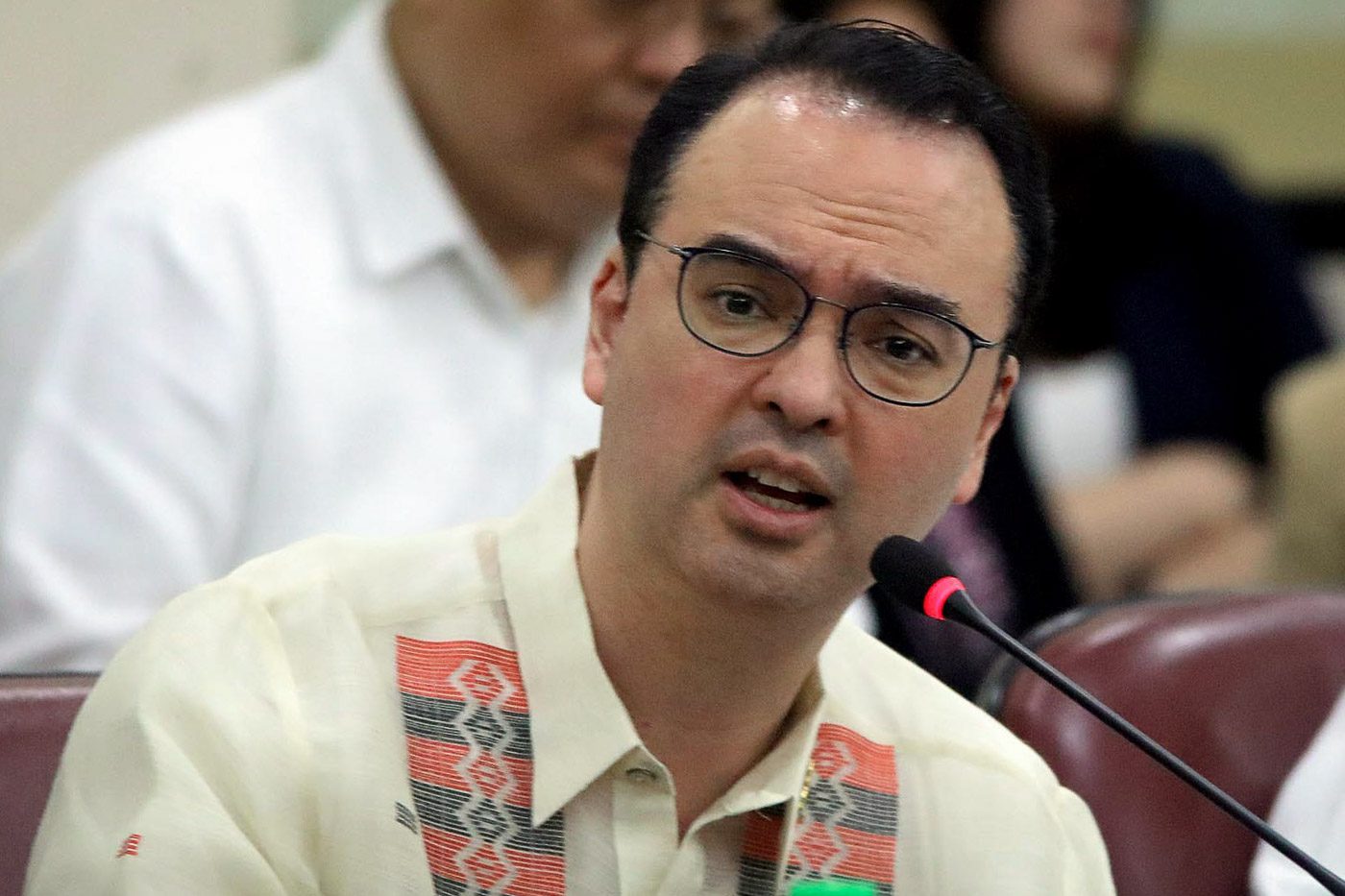SUMMARY
This is AI generated summarization, which may have errors. For context, always refer to the full article.

MANILA, Philippines – Foreign Secretary Alan Peter Cayetano maintained on Tuesday, March 6, that the West Philippine Sea is “disputed” even if a Hague ruling in 2016 upheld the Philippines’ rights over these waters.
In an interview with reporters, Cayetano explained that a dispute remains because the Hague ruling has no “enforcement mechanism.”
He also said there’s still a territorial dispute – or a dispute over islands, not waters – that is not covered by the ruling under the United Nations Convention on the Law of the Sea (UNCLOS).
“What are we going to do? Will we pretend it’s not disputed? So let’s be practical. Because we’re calling it disputed, it doesn’t mean that we’re not saying it’s ours,” Cayetano said in a mix of English and Filipino.
“Why fight about the nomenclature? I can stop using the word ‘disputed.’ It will not make it non-disputed. It will not move our claims any further,” he added on the sidelines of a hearing at the House of Representatives.
The Philippines’ top diplomat also criticized “so-called experts,” including Acting Chief Justice Antonio Carpio and maritime law expert Jay Batongbacal, for “confusing” people about the issue.
Carpio on Monday, March 5, said Filipinos should stop calling the West Philippine Sea “disputed,” as the Hague tribunal “has already ruled with finality.” In an interview on ANC’s Headstart, Carpio said this is no longer a question of ownership but of China’s compliance with the Hague ruling.
The West Philippine Sea is the part of the South China Sea that belongs to the Philippines, as affirmed by the Hague ruling in July 2016. The tribunal junked China’s claim over these Philippine waters.
What experts say:
Experts agree there’s no “international police” to enforce the Hague ruling. They also say, however, that if pressured by its neighbors, China will comply with the ruling because it cares for its reputation. (READ: How to enforce Hague ruling? PH lead counsel explains)
“Sure, they are more powerful, but they’re not immune to pressure. The Chinese care about their reputation, just like any country,” said Gregory Poling, director of the Washington-based Asia Maritime Transparency Initiative (AMTI), in a Rappler Talk interview in February.
“International pressure is the court’s only enforcement mechanism,” AMTI also said on its website.
“There’s a price to be paid for branding yourself as an international outlaw, as a state that doesn’t respect, that doesn’t comply with international law,” said Paul Reichler, the Philippines’ lead counsel in its case against China, in a speech in December 2013.
On Tuesday, we also asked Cayetano how the government can say it recognizes the Hague ruling while maintaining that there’s a dispute over the waters. He responded by comparing the West Philippine Sea issue to the case of Rappler’s registration, which was revoked by the Securities and Exchange Commission (SEC) but is now under appeal.
Read Cayetano’s response in the unedited transcript below:
RAPPLER: Sir, I understand that the official position of the Philippine government is that we recognize the 2016 Hague ruling. Sir, how can we say that we recognize the ruling while maintaining that there is a dispute over the waters, under UNCLOS?
CAYETANO: Because the UNCLOS does not deal with territorial disputes.
RAPPLER: Yeah, but just talking about the waters.
CAYETANO: Let me ask you a question. Is there a dispute whether Rappler is a foreign entity, or hindi? May court decision na, ‘di ba? But you’re disputing it.
RAPPLER: Sir, it’s not a court decision. It’s a SEC decision.
CAYETANO: There’s a SEC decision. But you’re disputing it. ‘Di ba? So it’s not fair for me to say it’s settled na. I have to say it’s disputed. So as far as UNCLOS, nasaan ang enforcement mechanism mo? You go in the middle of the dagat. Nandoon ‘yung Chinese ships eh. Nandoon ang Vietnamese ships. Nandoon ang Malaysian ships. So sino’ng magsasabing hindi disputed? And remember, our arbitration case was only filed against China. We have multiple claims. Nagke-claim din ang Malaysia, nagke-claim din ang Vietnam in some areas. Secondly, as I said, we recognize UNCLOS, the arbitration award, wala namang nagsasabi na hindi natin nire-recognize ‘yun, but that does not deal with territorial claims. So that’s why it’s disputed. But my question nga is, why fight about the nomenclature? I can stop using the word disputed. It will not make it non-disputed. It will not move our claims any further.
RAPPLER: Sir, just going back to your metaphor a while ago. Sir, the Rappler case is under appeal, but I think the Hague ruling does not entertain any more appeals. It is final and executory.
CAYETANO: No, no. It’s final; I’ll ask you, who will execute it? Who will execute it? China should comply, ‘di ba, but as I said, hindi covered kasi ng UNCLOS ‘yung territorial dispute. And China had reservations sa UNCLOS. So let China say why they don’t want to comply. That’s not for us to say. What we’re saying is simple. Kayong mga Pilipino, kayong lahat ditong kaharap ko, magkano binabayaran ‘nyo sa kuryente? Magkano binabayaran ‘nyo sa gasolina? Gusto ‘nyo ba na magkaroon tayo ng oil and gas para bumaba ang presyo sa Pilipinas, bumaba ang oil and gas? O gusto ‘nyo ba mag-away na lang tayo sa terminology? Kasi ‘yun lang naman ang choices eh.
– Rappler.com
Add a comment
How does this make you feel?
There are no comments yet. Add your comment to start the conversation.